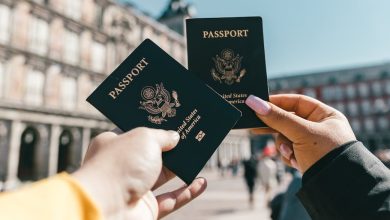With the recent increase in air travel and flight delays, many travelers are wondering whether it’s a good idea to check a bag at the airport.
Summer vacations, holidays, and events like weddings have led to a surge in airline and airport activity, with air travel returning to pre-pandemic levels.
However, the airline industry is struggling to cope with this demand due to significant staffing shortages caused by more than two years of COVID-19 travel restrictions.
Between July 5 and 14, there were over 54,000 flight delays worldwide, accounting for 20.8% of all flights during that period.
Flight delays and cancellations during this period were almost as common as they were in 2019.
These delays were mainly clustered around holidays and other high-traffic times.
As flight delays and cancellations become more frequent, the issue of lost luggage has also become more prevalent. Checking luggage or sticking with a carry-on can significantly affect a traveler’s experience.
When it comes to air travel, one of the first decisions you’ll face is whether to check your luggage or carry it on.
This choice can greatly impact your travel experience, from convenience to cost.
In this article, we’ll delve into the factors you should consider when deciding between checking your luggage or carrying it on board.
1. Baggage Fees
One of the most significant factors influencing your decision is baggage fees. Most airlines charge fees for checked luggage, whereas carrying on a bag is typically free.
If you’re looking to save some money, carrying on your luggage can be a wise choice. However, be aware of size and weight restrictions for carry-ons, as exceeding them may result in additional fees.
2. Convenience
Carrying on your luggage offers a level of convenience that checking it cannot match. When you carry on, you avoid the hassle of waiting at the baggage carousel upon arrival.
You can head straight to your destination, saving precious time. Plus, you have all your essentials with you during the flight, making it easier to access items you may need.
3. Security
Another aspect to consider is security. When you check your luggage, it goes through a screening process that ensures prohibited items don’t make it onto the plane.
However, there is always a slight risk of your checked bag getting lost or delayed, which can be stressful. Carrying on your luggage eliminates this risk, as it stays with you throughout the journey.
4. Packing Considerations
The size and type of items you’re bringing play a crucial role in your decision. If you have fragile or valuable items, you might prefer to carry them on to ensure they’re handled with care. Conversely, if you’re traveling with larger items or a lot of baggage, checking might be your only option.
5. Overhead Bin Space
When choosing to carry on your luggage, it’s essential to consider the available overhead bin space on the plane.
If you’re in a later boarding group, the bins might already be full, forcing you to check your bag at the gate. To avoid this, try to board early or opt for a smaller carry-on bag.
6. Travel Duration
The duration of your trip can influence your decision as well. For a short weekend getaway, carrying on a small bag might suffice. However, for longer trips or those with varied climates, you may need to check a larger bag to accommodate all your clothing and essentials.
7. Airport Mobility
Consider your own mobility when deciding between checking or carrying on. If you have difficulty maneuvering through crowded airports with a heavy bag, checking your luggage might be a more comfortable option.
8. Security Regulations
Be aware of any security regulations that may affect your decision. For example, certain liquids or sharp objects may not be allowed in your carry-on, so you’ll need to check them if necessary.
9. Personal Preference
Ultimately, your personal preferences should also guide your decision. Some travelers prefer the peace of mind that comes with carrying on their luggage, while others don’t mind checking it for the sake of convenience.
Is it ever a good idea to check a bag?
Checking luggage is a common practice for most air travelers, with roughly 55% choosing to check some or all of their bags, according to a survey by Go Group LLC.
Kareem George, owner of Culture Traveler and a member of Travel + Leisure’s 2022 A-List Travel Advisory Board, suggests that checking luggage is convenient for those who want to pack more, especially for longer trips, and for avoiding the hassle of carrying items through the airport.
However, carrying a carry-on allows for greater mobility. Travelers who decide to check luggage should be aware of additional fees, which typically start around $30 for one bag for domestic travelers and increase for each additional bag.
There is also a weight limit of around 50 pounds per bag, with bags exceeding this limit incurring additional costs.
While lost luggage is not common, with 92% of missing bags eventually being found and returned to their owners, checking luggage can increase the chances of delays leading to baggage mishandling.
Sticking to carry-on luggage
Carry-on luggage, limited to one small suitcase or duffel bag and another smaller item that fits under the seat or in the overhead compartment, can be more practical during busy flying seasons.
It allows for efficient packing and quicker mobility during transit, which can be crucial for making tight connections.
Traveling with a carry-on is particularly useful when taking connecting flights, increasing the chances of successfully making those connections.
Travelers should note that different countries may have varying size and weight restrictions for carry-on luggage, and traveling with checked luggage between countries can be more cumbersome if it gets lost or delayed.
What can you bring in a carry-on?
Certain items, such as medication and medical equipment, should always be carried on the plane.
Airlines may request travelers to check their luggage when there’s no more space on the plane, so travelers should be prepared to keep essential items with them.
Over the years, airlines have added more seats to planes without increasing storage space, leading to carry-on luggage becoming a popular choice. However, some airlines now charge fees for full-size carry-ons with select tickets.
While there are limits on carrying liquid, cream, or gel items in carry-on luggage, there are exceptions for medical liquids, breast milk, and infant formula.






